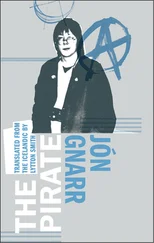— The boy’s hung like a horse!

They looked at me and laughed. I didn’t know what it meant, but it was still a pleasure. It meant that there was something good about me. I wasn’t just a problem. Maybe I was incredibly tough. And it was fun to see everyone laughing, especially my mother.
Aunt Salla is here, too. She’s also my mom’s sister. She’s the eldest. She’s thin and has creased features. I like her best of all. She’s always nice to me.
Before we moved to Fossvogur suburb, we lived on Skipholt, on the top floor. During the day, Mom would take me out into the yard and tie me to a pole with a long rope, so that I could play in the garden but wouldn’t get too far away. I was little. But I worked out how to untie the rope. And I tried to run away to Aunt Salla’s home. At one point, the police stopped me because I was trailing this very long rope behind me. They asked me where I lived, but I wouldn’t tell them. I just wanted them to leave me alone so I could go to Salla’s. However, they put me in a police car and took me down to the police station. A very nice woman there gave me donuts.
I was just settling down and preparing to spend some time there when my father came past and noticed me. He was astonished. He was at work and didn’t know what I’d been up to.
— Isn’t that my kid? he asked.
Things are always fun around Salla. She gives me treats. Her house smells good, and behind it there’s a massive park with a playground. She also has a large, black elephant made of stone; he’s friends with Action Man. When Salla’s niece comes to visit, she always gives me candy. Sometimes she gives me toys, too, even if it’s not my birthday.
One time she gave me a metal plane. It was very cool. You could see the faces of the passengers through the windows. The aircraft had wind-up wheels and could drive itself along the floor. But planes don’t drive. They’re meant to fly. So I took it to the top of the apartment block that was being built close by. I often went there secretly. I knew it was forbidden, but I didn’t care. It wasn’t someone’s home so I wasn’t disturbing people.
I enjoyed climbing the scaffolding and throwing things off the roof. But you have to be careful when you are very high up on a roof: if you fall then you can die.
Once I did fall. But it was okay because I just hit the scaffolding below. I hurt myself, but not much. At least, I didn’t die. The Lone Ranger has often fallen down and has even hurt himself badly.
I played with the airplane for a while. It was going to fly to Trondheim, Norway, where my sister Kristín lives. All the passengers were very excited and felt happy to be going abroad. They all wanted to go to Duty-Free and buy salt licorice and PK-chewing gum. Then they were going to go see the cathedral in Trondheim.
I took a running start and threw the plane high up in the air, off the roof. The passengers grinned because they were airborne.
The aircraft completed many circles in the sky before it fell to the ground.
I ran down.
It had landed in a heap. The wheels had broken off. It was a plane crash, and in all plane crashes, the planes catch fire.
I had some matches on me. I piled rubbish around the fuselage and set fire to it. The paint on the plane scorched. The merry faces of the passengers melted and turned into black blobs. No one survived.
I wish I’d had some bombs. Sometimes, after New Year’s Eve fireworks, I have bombs. I stuff them into toys and light them.
It would have been fun to see the plane explode in the air and come apart.

Jón Gunnar’s problems increase innumerably. He is heedless, incautious, seems never to learn anything from experience. He is isolated from his group of friends, yet always wants to be in charge and uses any means at his disposal to become their leader, even damaging their toys. He can, however, on several occasions appear quite normal if just with one child at a time, especially indoors. The boy’s imagination is boundless — he’s always off in some other world — though he doesn’t especially suffer any distress from this. He is very careless about his things, as though nothing really matters to him. He doesn’t have a lot of fear; after the parents discussed it at length between themselves, they agreed that what had affected him most in the last two years were some scenes from children’s shows on TV. The parents find it very troublesome that he tends to have difficulty concentrating.
(National Hospital, Psychiatric Ward,
Children’s Hospital Trust, 02/04/1972)

All the women sit in the kitchen and talk. They talk about their jobs and some friends and what’s on their mind.
They tell stories about the old days. I love hearing how everything was in the old days. Back then, everyone was always drunk and lived in turf houses. Also, everyone was really poor and when they went to the movies they ate raisins instead of popcorn.
The women also know tons of stories about people who were total dumbasses as children. One woman, for example, kept peeing herself, even after she’d become a teenager. My mom looked after her and tried to break the habit by making her smell her panties whenever she peed herself. That would make her start to cry. Mom did an impression of her:
— Dob’t bake me smell dem, Gútta, dob’t bake me smell!
But Mom made her sniff her pissy clothes; eventually, she broke the habit, married some guy, and moved to Australia.
Another woman had a speech impediment and couldn’t say arr or ess until she was an adult.
— Hi, my name is Thalla Kwithtinthdóttiw!
They’re fascinating stories. The aunts talk animatedly and mimic people. And then they laugh.
Sometimes, though, they talk about serious things; they know all kinds of horror stories. Some are about people who have gotten injured and died or become cripples. And usually people are injured when they’re least able to afford it, so it’s an especially hard blow for everyone. People are always carefree and merry at the beginning of such stories, but their world comes crashing down in a single moment.
The moral of these stories is that, just because you think that everything is OK, and it definitely seems to be it, actually it often isn’t.
You lower your voice when telling such stories.
They also know stories that make my skin squirm a bit, stories about women who have gotten pregnant and had a baby which at first seemed okay, but then they began to suspect that something wasn’t right. Everyone told them that everything was fine and they were worrying unnecessarily.
— But she didn’t feel right…
And in the end, I always found out that the child was blind, or handicapped, or both.
— She said: Something’s wrong with the baby. No one else saw anything worth checking into. But they took it to the doctor and he looked at it and then it came out…
— It was a mango!
— Exactly. Because she was so old when she gave birth.
— But he’s very nice. Always tidy and clean.
Yeah, exactly. Mangos are usually harmless.
Salla doesn’t say Mong, but mango, like the fruit.
— Like when Halli and Áslaug had that boy…
— That was horrible!
— Yes, it must be awful to have such a deformed child.
— Tragic.
— It didn’t have any eyes! Then again, better that than to be stillborn.
Читать дальше





![О Генри - Бабье лето Джонсона Сухого Лога [The Indian Summer of Dry Valley, Johnson]](/books/407344/o-genri-babe-leto-dzhonsona-suhogo-loga-the-india-thumb.webp)









